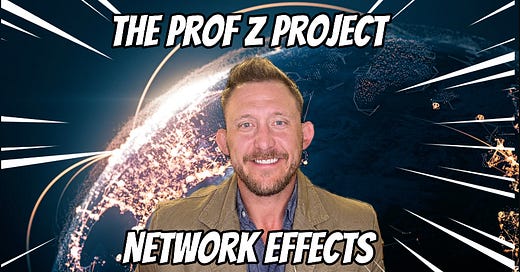Success doesn’t just come from talent or luck. Those help—but they aren’t the whole story. In both business and life, the most overlooked force behind outsized outcomes is something else entirely: Connection.
Robert Metcalfe, the Turing Award-winning inventor of Ethernet and professor at the University of Texas at Austin, gave us a law that explains why. Metcalfe’s Law states that the value of a network grows with the square of its users (n2). In plain English: every new participant doesn’t just add value—they multiply it.
That’s the magic of network effects—and they’re responsible for over 70% of the value created in tech companies since 1994.
Now here’s the twist: network effects aren’t just for billion-dollar businesses. They can apply to your life too.
This Substack is reader-supported. To receive new posts and support my work, consider becoming paid subscriber.
What Is a Network?
Every part of your life is a network.
The language you speak connects you to a cultural network.
The university you attend plugs you into an alumni network.
Your job, your gym, your church, your kids’ school—all networks.
And in each one, you’re a node. A connector. A potential multiplier of value.
At the core of every network are two things:
Nodes (people or systems)
Links (the stuff that connects them—ideas, money, trust, attention)
The more nodes and the more meaningful links, the more powerful the network.
What Makes a Company Defensible
According to NfX, there are four core ways companies defend themselves from competitors:
Brand – Emotional moats that create loyalty and belief (think Nike, Apple).
Embeddedness – High switching costs (like Salesforce or Oracle).
Scale – Bigger companies get cheaper unit economics as they grow, considered economies of scale (Walmart and Amazon)
Network Effects – Every new user adds value for everyone else, directly or indirectly.
And there are several types of Network Effects:
Physical & Protocol: The original network effects—landlines, Ethernet, the internet.
Personal Networks: Social platforms like Facebook, Twitter, WhatsApp.
Marketplaces: Amazon, eBay. More buyers attract more sellers, and vice versa.
Platforms: Operating systems that bring develops and users together like iOS, Android, or gaming systems like Xbox and PlayStation.
Data Networks: More users = better data = better product (think Google, Waze, Yelp).
Social/Tribal: Fandoms, language, shared beliefs, and the psychology of FOMO.
These network effects create flywheels. The more people join, the better the experience gets—for everyone.
How to Build Personal Network Effects
Now let’s see how this concept can work in your personal life too. Because this isn’t just a business concept—it’s a blueprint for building a better life.
Here’s your personal network effect playbook:
Be a Node, Not Just Noise
Put things into the world that connect—ideas, help, support, value. Don’t just take from others. Build.
Connect with Hubs
Spend time with highly connected people. Find rooms where serendipity can do its job. If everyone around you knows the same people, your network isn’t expanding.
Create Value Loops
Introduce people. Share insights. Help someone get a job or raise money. Give more than you take.
Join Real Platforms
Not just LinkedIn or Twitter. Join ecosystems—alumni events, jiu-jitsu gyms, community meetups, church groups. Show up where the real relationships are created and sustained.
Embed Yourself—but Not Forever
Become so useful you’re hard to ignore—but don’t hoard your role or over engineering your work for job security as that will also get you stuck. If you’re truly valuable, work yourself out of your job so you can go on to do more. That’s growth.
The Network Effect Is a Relection
Your network reflects your value.
If you’re generous with your ideas, others will be generous back.
If you help others rise, they’ll help you when it’s your turn.
If you’re generous with your ideas, introductions, and support, those things flow back to you. As I wrote in Network as a Service Mindset, give first—before you ask. The network effect works the same way. It’s not transactional. It’s reciprocal. Your relationships, reputation, and reach will grow faster when you’re creating value for others.
Look at your life:
Who shows up for you?
What doors open?
How fast do things happen?
That’s not luck. It’s often the compound interest of generosity, trust, and reputation.
Don’t just build a resume. Build a network that reflects the impact you make.
Connect with Zach
Website • Twitter • LinkedIn • Youtube





